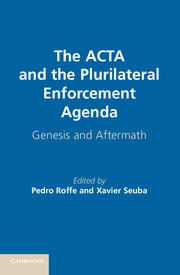Book contents
- Frontmatter
- Contents
- List of Contributors
- Foreword
- Acknowledgments
- Acronyms
- Introduction
- PART I THE FINAL ACT: ITS MAIN FEATURES AND CONTENTS
- PART II DOMESTIC LEGISLATIVE CHALLENGES
- PART III IMPACT ON RELATED PROCESSES
- PART IV VIEWS FROM STAKEHOLDERS: LESSONS
- 17 Lessons Learned from the ACTA Process
- 18 Lessons Learned from the ACTA Process
- 19 ACTA, a View from the Eye of the Storm
- 20 ACTA, the EU, and Economic, Social, and Cultural Rights in the Digital Environment
- PART V WHAT LIES AHEAD ACTA
- Annex I Anti-Counterfeiting Trade Agreement
- References
- Index
- References
20 - ACTA, the EU, and Economic, Social, and Cultural Rights in the Digital Environment
Published online by Cambridge University Press: 05 December 2014
- Frontmatter
- Contents
- List of Contributors
- Foreword
- Acknowledgments
- Acronyms
- Introduction
- PART I THE FINAL ACT: ITS MAIN FEATURES AND CONTENTS
- PART II DOMESTIC LEGISLATIVE CHALLENGES
- PART III IMPACT ON RELATED PROCESSES
- PART IV VIEWS FROM STAKEHOLDERS: LESSONS
- 17 Lessons Learned from the ACTA Process
- 18 Lessons Learned from the ACTA Process
- 19 ACTA, a View from the Eye of the Storm
- 20 ACTA, the EU, and Economic, Social, and Cultural Rights in the Digital Environment
- PART V WHAT LIES AHEAD ACTA
- Annex I Anti-Counterfeiting Trade Agreement
- References
- Index
- References
Summary
INTRODUCTION
During the debates sparked by ACTA, civil rights, such as privacy and freedom of expression in the digital environment, attracted a great deal of attention while hardly any scrutiny was expended on economic, social and cultural rights such as access to knowledge and culture, remix artists, patent trolls and sequential innovation.
This chapter applies an economic, social and cultural human rights analysis to the four issues largely ignored by the debate. It discusses three human rights that are relevant to the digital environment: the right to access to knowledge, the right to access to culture, and authors’ rights – all of which are enshrined in the Universal Declaration of Human Rights and the UN International Covenant on Economic, Social, and Cultural Rights (ICESCR).
BACKGROUND
After massive street protests against ACTA, the European Commission requested that the European Court of Justice (ECJ) rule on the agreement’s compatibility with the Charter of Fundamental Rights of the European Union in April 2012. However, in December 2012, the Commission withdrew the court referral, explaining that the decision was made on the grounds that there was “not any realistic chance that the Council and the European Parliament will agree to the proposed treaty.”
Indeed, the Parliament had not waited for the ECJ’s opinion and it resoundingly rejected ACTA on 4 July 2012 by a majority vote of 478 to 39 with 165 abstentions. Prior to this vote, various opinions had found the agreement incompatible with fundamental rights instruments. Such concerns were voiced, inter alia, by European Academics (2011), Korff and Brown, the European Data Protection Supervisor, ARTICLE 19 and the European Parliament’s committee on Civil Liberties, Justice and Home Affairs.
- Type
- Chapter
- Information
- The ACTA and the Plurilateral Enforcement AgendaGenesis and Aftermath, pp. 299 - 310Publisher: Cambridge University PressPrint publication year: 2014



